I have been rereading Carol Plum Ucci’s excellent teen novel, “What Happened to Lani Garver”, and that caused me to start considering angels, and what they really are.
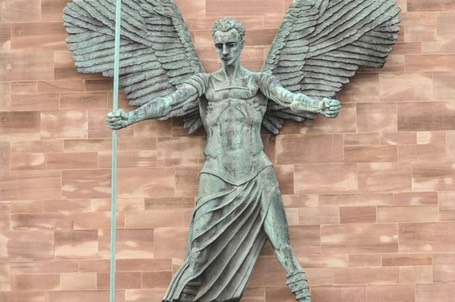
(Epstein’s Saint Michael the archangel, Coventry Cathedral)
It is now October, 2019. In a little less than five years, as all passionate Niners know, the Bell riots will take place in San Francisco. Government troops will open fire on impoverished, homeless citizens and kill hundreds.
Showrunner Ira Steven Behr commented that, as they were filming the show, politicians were actually talking about putting homeless people in sanctuary districts—ghettos like those we see in these episodes. He was appalled at how close to real life a science fiction story became.
In Donald Trump’s America, where children are being torn from their parents’ arms and locked in cages, these episodes seem even more relevant than they were thirty years ago. The world of the Bell Riots and the sanctuary districts is a world of extreme capitalism, casual racism, and great wealth juxtaposed with dire poverty. It’s no wonder Past Tense, in spite of some weaknesses, is among the most admired of DS9 episodes.
Plenty of reviewers have discussed Past Tense. They’ve looked at the way the story shows the mentally ill, class divisions, government, and even redemptive violence. They’ve quibbled about the technobabble and some minor logical glitches in the time travel. All fair enough! But, so far as I know, no one has focused on the story’s spiritual overtones.
For those who don’t know, an accident plunges science officer Jadzia Dax, doctor Julian Bashir, and commander Benjamin Sisko into life in 21st-century San Francisco. The transporter malfunction knocks the three out, though they are not seriously injured. Jadzia, a lovely, fair-skinned young woman, is rescued by a wealthy tech maven. The other two, both brown-skinned, mixed-race humans, are arrested by the police and brought to the sanctuary district. While they are being processed, Sisko realizes they must find their way home quickly, or they will be trapped in the Bell riots.
As the captain and the young doctor try to survive and fit in, they witness some thugs attacking another homeless person. A Black man springs to the rescue, and is stabbed for his pains. The murdered man is Gabriel Bell, and Sisko decides to take his place lest the timeline be altered.
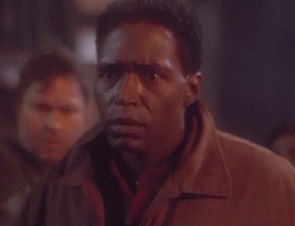
(Gabriel Bell, a homeless man, tries to help a mugging victim.)
So he becomes Gabriel Bell. The other leader of the riots, who helps to keep the hostages safe, is Michael Webb. The person who instigates the violence in the first place, and who kills Bell, is B.C.
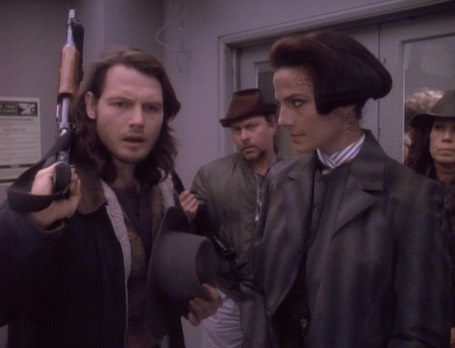
(B.C. and Jadzia Dax)
I don’t want to make too much of B.C.’s initials. That might not even be intentional—though it’s certainly interesting. But I have no doubt whatever that the names of the two heroes are intentional. Let’s have a look at them.
First, Gabriel and Michael are the names of Archangels. The function of angels in the Bible—in fact, the meaning of the name in Greek—is as messengers of God. The Archangel Gabriel, in particular, is entrusted by God with an important message for all mankind. He announces the imminent birth of the Messiah.
St. Michael is the angel who, according to legend, thrusts satan down from heaven. He’s a warrior of light.
Now, the surnames. Gabriel Bell’s surname tells us he will give us a summons or a warning. The truth he speaks is something we must act on. Also, when we see the real Bell, he is alone. His function is to stand for justice and to call out injustice. This is what we first see him doing, and it’s also what Captain Sisko does when he takes the dead man’s place.
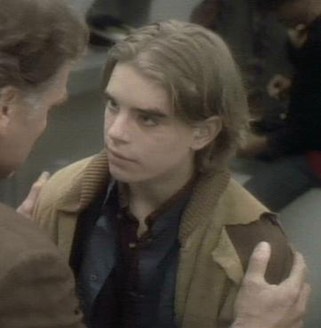
(Michael Webb speaks to his son Danny.)
When we first see Michael Webb, he is tending to his young son, whom the thugs have attacked and robbed. He’s a family man, with a wife and at least two children we hear about. He was also, if I’m remembering rightly, a union leader when he had work. His focus is community and family—the life-giving webs he’s enmeshed in. And his message, what he wants most, is to be heard and to be given useful, meaningful work so that he can contribute to that community and support that family. It’s a desire most of the unemployed homeless share. (They are called gimme’s in the show, as the mentally ill are called dims and B.C.s gang of thugs are called ghosts.)
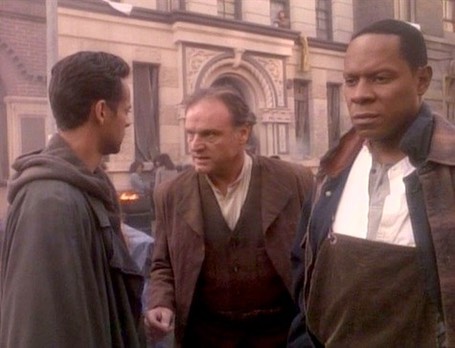
(From left, Bashir, Webb, and Sisko/Bell)
So, in a way, Bell and Webb communicate the same message. “Look!” they call out. “Look how this country treats the poor and those who need help. We can do better.” Webb adds, “ We’re poor and homeless now, but we’re proud people who can work and be productive citizens and members of communities. Let us work and contribute!”
There’s more. Though the Federation of Planets is essentially a peaceful union, Captain Sisko is a soldier in that organization. But Bell is killed, and Sisko injured, in defending others.
Michael is truly a man of peace, but he dies when he draws a gun in order to defend himself. He dies a warrior.
And perhaps the most important thing: in spite of their sacrifices, or perhaps because of them, Bell, Sisko, and Webb succeed. The riots are a wake-up call and the United States begins to transform itself and become a country that could lead to the peaceful, just, and outward-looking Federation of Planets.
So, will we listen? Will we start considering the message Gabriel Bell and Michael Webb try to communicate to us? I hope so.
For, when angels speak to us, the first thing we’re required to do is listen.
“Do not neglect to show hospitality to strangers, for thereby many have entertained angels unawares.”
